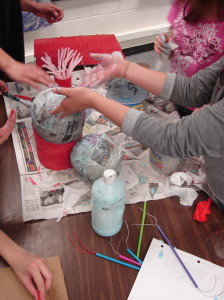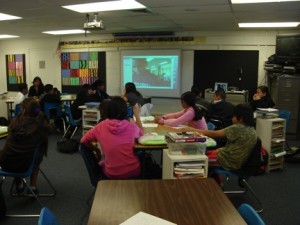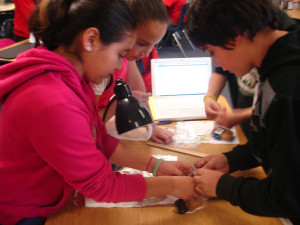I remember back in the day (or do people still do these?) when teachers in 4th or 5th grade tended to assign “the state” or “the country” report. Way too often the assumption was made that the students pretty much knew how to do these. The teacher would pass out the “packet” that explained the project, showed an example of a bibliography and often included templates for specific information that was to be included (state name, population, area in square miles, draw a map labeled with specific information and so on). Photos, usually from cut up National Geographic Magazines or brochures from travel agents were required. Typically the report was due in a month or six weeks. Each week they would have students check in with their progress and to allow students to ask questions about anything they didn’t understand about the report.
Like science fair projects it often appeared like someone a bit older (and maybe with a college degree?) might have “helped” somewhat … or they were incomplete or were of poor quality. Some did well, but how much learning actually occurred was questionable. This was the way this had always been done, it was “challenging” and, like the infamous science fair project, expected.
One of my main concerns about these projects was the assumption that students knew how to do all the work that went into the report and this was just a chance for them to put together a big project integrating all those skills. AND, after all, they were allowed to ask questions about what they didn’t understand (like they would even know exactly what they didn’t understand or know how to do). Since these were really long term homework projects the teacher didn’t see the work being done which made facilitating difficult.
Early in my career I had the same experience when facilitating projects in my classroom. I knew doing projects was supposed to be “good stuff,” so it was important to do them. Things would often hum right along as students worked on a project and I would allow myself to get sucked into observing from across the room, just to keep an eye on things, and would even do a quick task like lunch count or attendance or a quick email. Questions would pop up or a student or 2 would need some redirection, but often it was great to just let students work – or so I told myself.
Too often though after a “way too short” a period of time, some students would start claiming they were “done” or “done with that part”. Their work was almost always poor or incomplete or was off subject or all the above. This led to frustration on my part and a decreasing interest in the project by students (which was more frustrating since this is an awesome project dammit!!!).
Another observation I noted was that students were often very poor at working in a group. Even though I’d make groups have a meeting before they could get to work to go over what needed to be done that day and split up the work … which everyone in the group had to agree on so the group couldn’t just dump certain tasks on certain individuals. There would still be individual students off task, wandering around and too often causing issues. When the group would complain the student would often claim the work was dumb or boring … the group would respond that they agreed to do that part and weren’t getting anything done.
It took me awhile to understand that what was really going on (at least most of the time) was that this off track student didn’t really understand what to do, or how to do it, or even what the reason for it was. Anger, name calling and frustration was often the result (and more frustration for me … “the students were so excited about this project!!!”)
What I learned from these experiences and various classes, PD sessions and conversations with peers was that I was assuming students knew how to do these things … and mostly even the “on-task” students didn’t have a good grasp of them.
 I learned to do some relatively simple individual and group projects, early in the year especially. I’d do some without much work on group dynamics and let problems arise so we could talk about the real feelings they were having and then give them some skills to constructively deal with them.
I learned to do some relatively simple individual and group projects, early in the year especially. I’d do some without much work on group dynamics and let problems arise so we could talk about the real feelings they were having and then give them some skills to constructively deal with them.
One they loved was role playing the very issues they had just experienced. I would usually take a seat in a group and demonstrate how calling each other names was probably NOT going to lead to cooperation. Instead I would teach them to ask questions like, “Toni do you understand how to do that?” – Often that was the crux of the problem … the group mate just didn’t know exactly what to do but didn’t want to admit that and look dumb. Another important skill was just noting that maybe 2 students in the group should work on that part together … which led to students experiencing really being included.
We would brainstorm how to talk to each other respectfully. Next we would role play different “off task” situations and have every group talk through the issue to a positive conclusion (how to deal with a student in their group wandering around or throwing things or just sitting there). These were a hoot, lots of laughter, especially when a student that had a reputation of being a “model student” took on the “off task” student role. It was so obvious the more we did these lessons that one of the issues was that students just didn’t have the words or skills to deal with conflicts that arise.
I also had a rule that I would not come to answer a question unless everyone in the group had the same question and had their hands up. This promoted using your group members as resources and saved lots of time. You don’t end up or bouncing around the room or with the line of students waiting to ask you a question they could have had answered quickly by the group. It also fostered a “working together” culture.
We’d talk about how fast the time goes by when you are truly cooperating and looking out for each other. And they saw this play out.
In addition I started walking around the room and sticking my head into each group to listen and watch – all the time … I’d take notes about lessons or “mini-lessons” I should consider when I’d note anything from paragraphing, a science concept, how to use a technology piece or tool, how to add white glue to paint so it doesn’t crack when you paint landscapes and other cooperative group dynamics issues and more.
I stopped making these projects homework, unless a student or students asked if they could work on it after school or at home. It was way too valuable to do assessment through their doing. Observing and facilitating student work gets to individual and class strengths and weaknesses and students see that this is something they didn’t know how to do, but has value in their learning and doing. What I made homework was resource gathering – materials, but also experts in their lives – someone’s family member that had a certain skill or knowledge to share. Some even found experts online and we had numerous video-conferences with experts contacted by students. 
When I work with teachers in my current job and bring up these ideas the number one obstacle for them is not believing they have the time or “permission” to spend on building a culture of learning.
This blog is entitled, “Learning Is Messy,” and building a supportive classroom culture is as messy as it gets. But in my experience it is what this testing, accountability and assessment culture has gotten us away from.
So as you start this year off, think of doing some simple projects to build a learning culture on.
Learning is messy!


This was an interesting read for me because I grew up doing group projects so it is basically second nature for me. I did not realize that my students might not exactly know how to go into a group project. I like how you mentioned talking through made up problems as a group in a positive way so that the students would know how to do it when the real problems arise. I also like that you mentioned not answering a question unless every student had the same question. This forces the group to work together and come to resolutions as a group. This will help them in future group projects as well. I am studying to become a teacher now so this is very helpful information considering I have not thought much about this topic.
Hi Keegan – I really found the techniques you mentioned to be powerful … wished I’d started using them much earlier in my career. Thanks for the comment!
All through middle school, high school, and now college I have always HATED group projects. I am currently in school to become a teacher and have pledged to never have group projects in my classroom… This article has made me re-think that pledge. From my experience, most of the time in group projects I would end up in a group that slacked off and I would do majority of the work or re-doing what others did poorly. It never occurred to me that my group mates might not know what they were supposed to be doing, I had always just assumed that they simply did not care. Knowing this, I believe that I will be able to have successful group projects in my classroom someday.
I need to write a post about active learning … short version- students have to plan what everybody in the group is doing and constantly check with each other how things are going and help each other where and when needed … the largest part of their grade (around 70%) should be based on how they work together in a group. – sounds crazy, but when a group is truly collaborating and checking on each other and staying on task they just happen to do quality work and learn tons. Your job is to constantly roam around and facilitate where needed and note where you might need to do a lesson on anything they need. Anything from paragraphing, to how to cut cardboard with scissors and so forth. Thanks for the comment!!
Brian
Going through school I always hated group projects. As a student in college studying to be a teacher I had all intentions to never give my students group projects, but this post has made me reconsider. I never took a moment to think that my group mates and myself didn’t collaborate and work well together because of the possibility of some of us not fully understanding the project. With this insight and the strategies that you discussed, I think that I would be able to have group projects in my classroom that my students would not despise.
It’s pretty funny but I do a number of group projects with my US 1 history class (10th graders) and I believe we run into some of the same problems as the younger kids, though not the name calling! I’ve had to incorporate some of the same things, walking around listening to the groups work together and realized that even at the high school level some of the kids are lost as well. It’s made me go back and adjust things in my lesson and to explain them more thoroughly and even use examples of many of the things I am asking them to do.
Hi Jeff – yes, we’ve gone through a period of time when much of this kind of work was not emphasized (or even experienced at all) in elementary school – the payoff is that students don’t know how to do this kind of work or interact with peers in constructive supportive ways.